Thomas James Richards, Diaries, Transcript Vol. 2 - Part 9
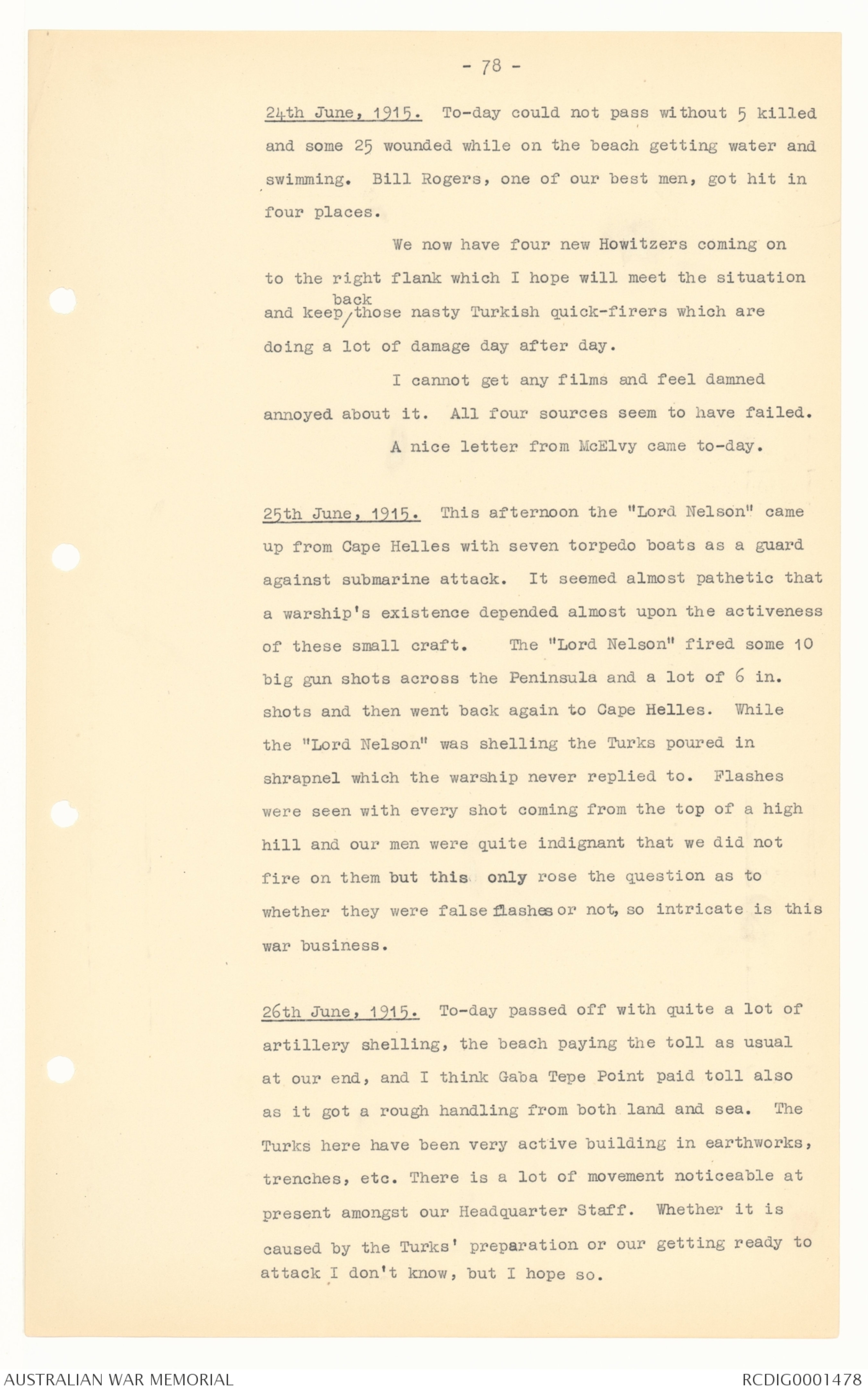
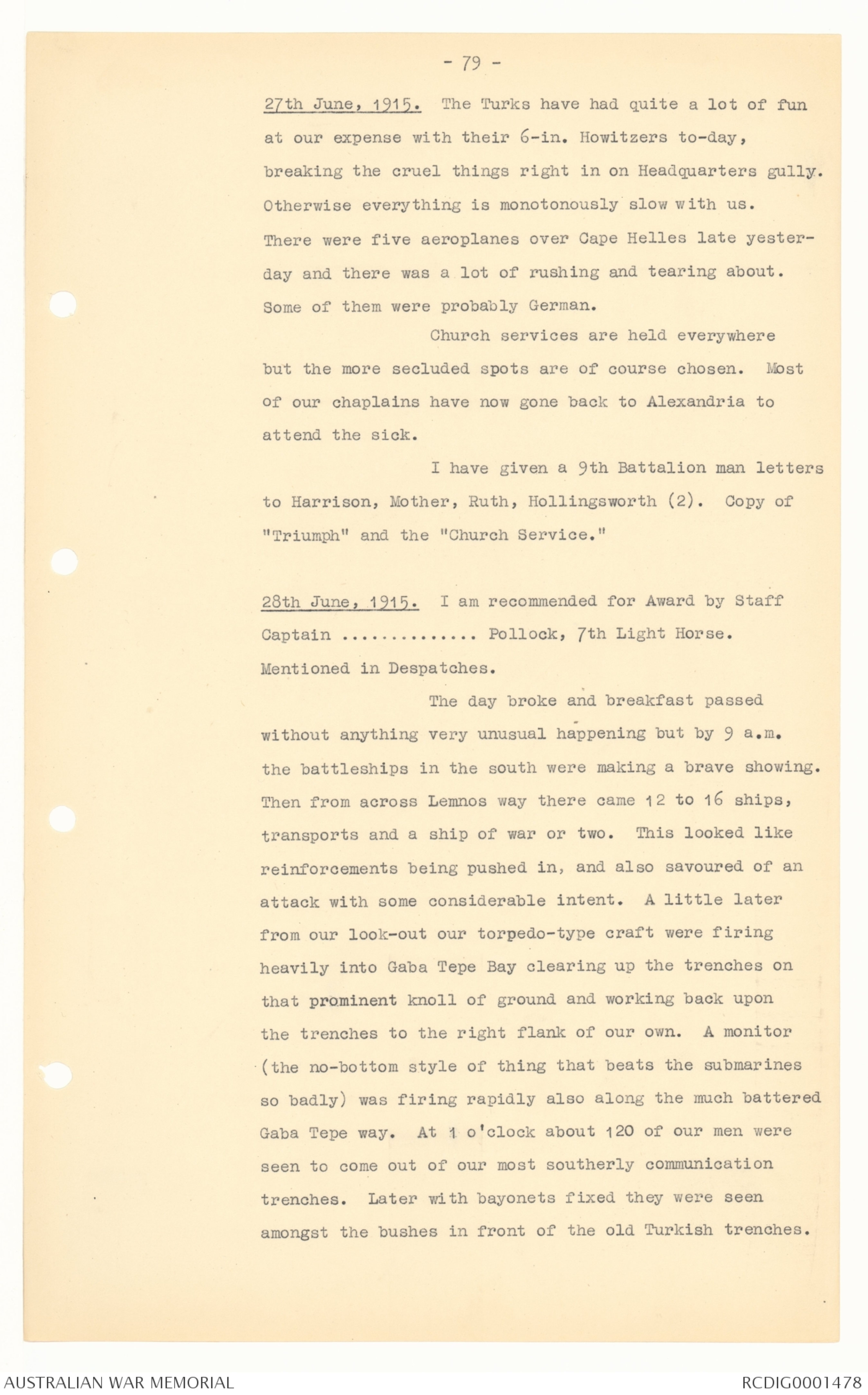
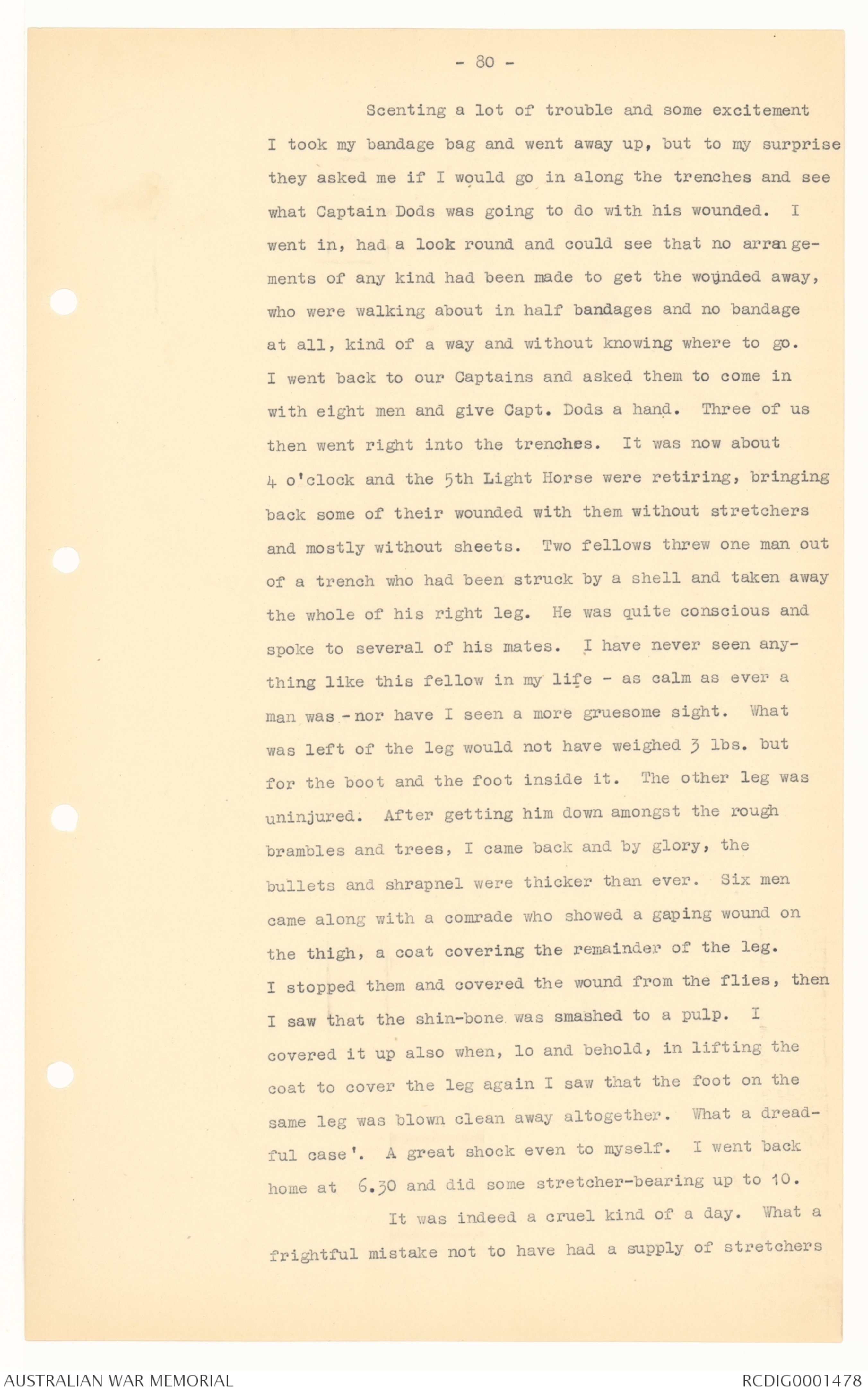
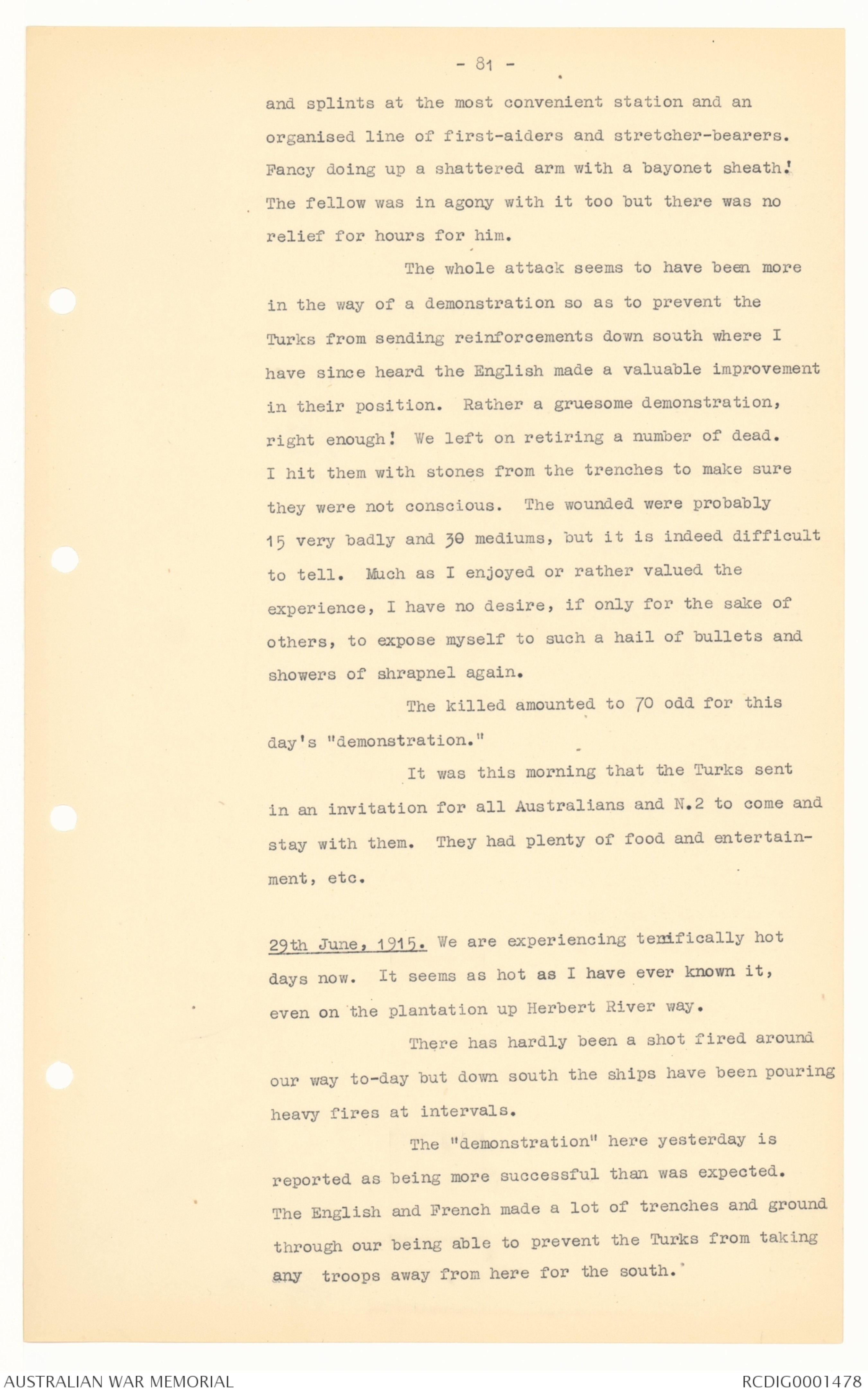
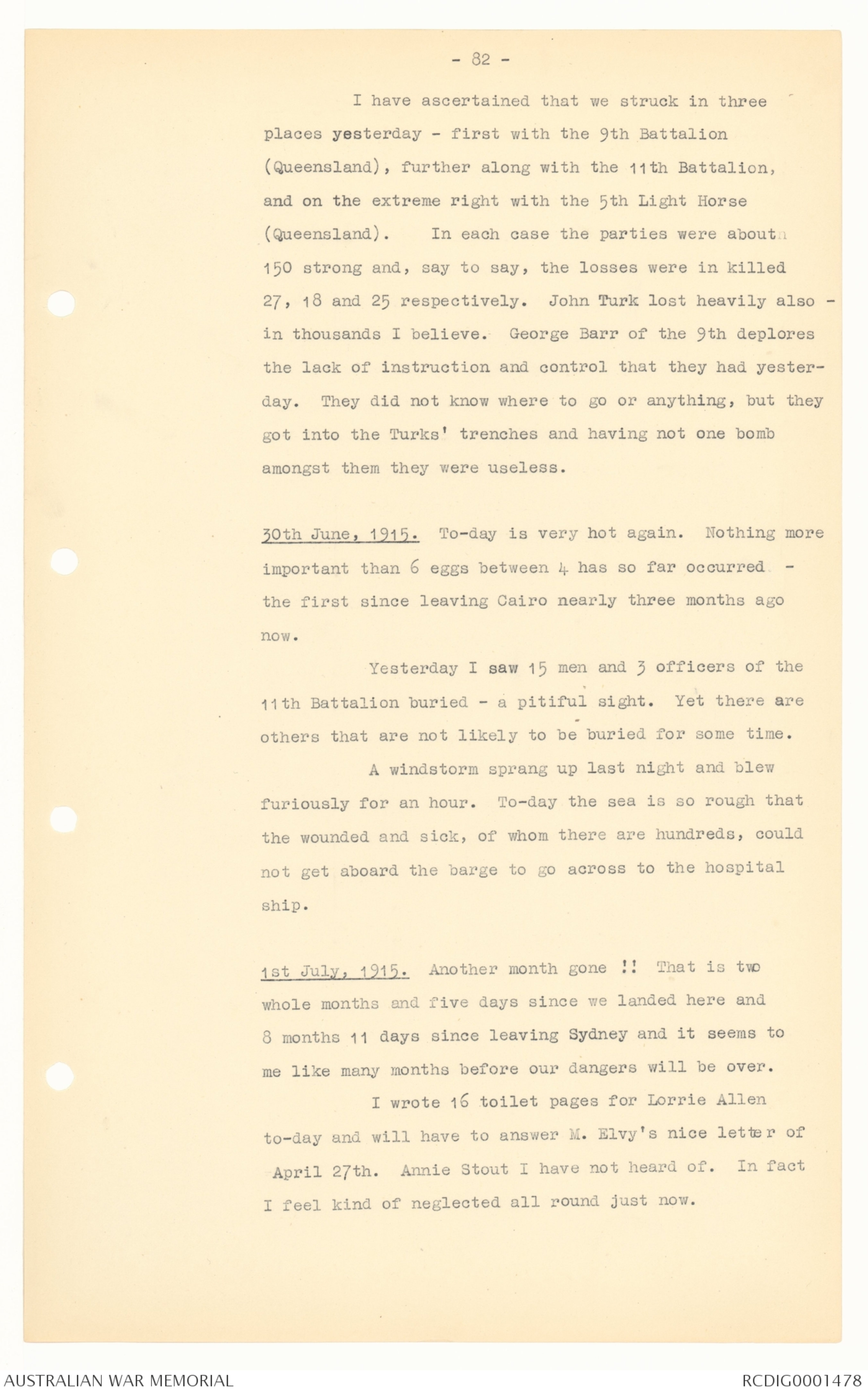
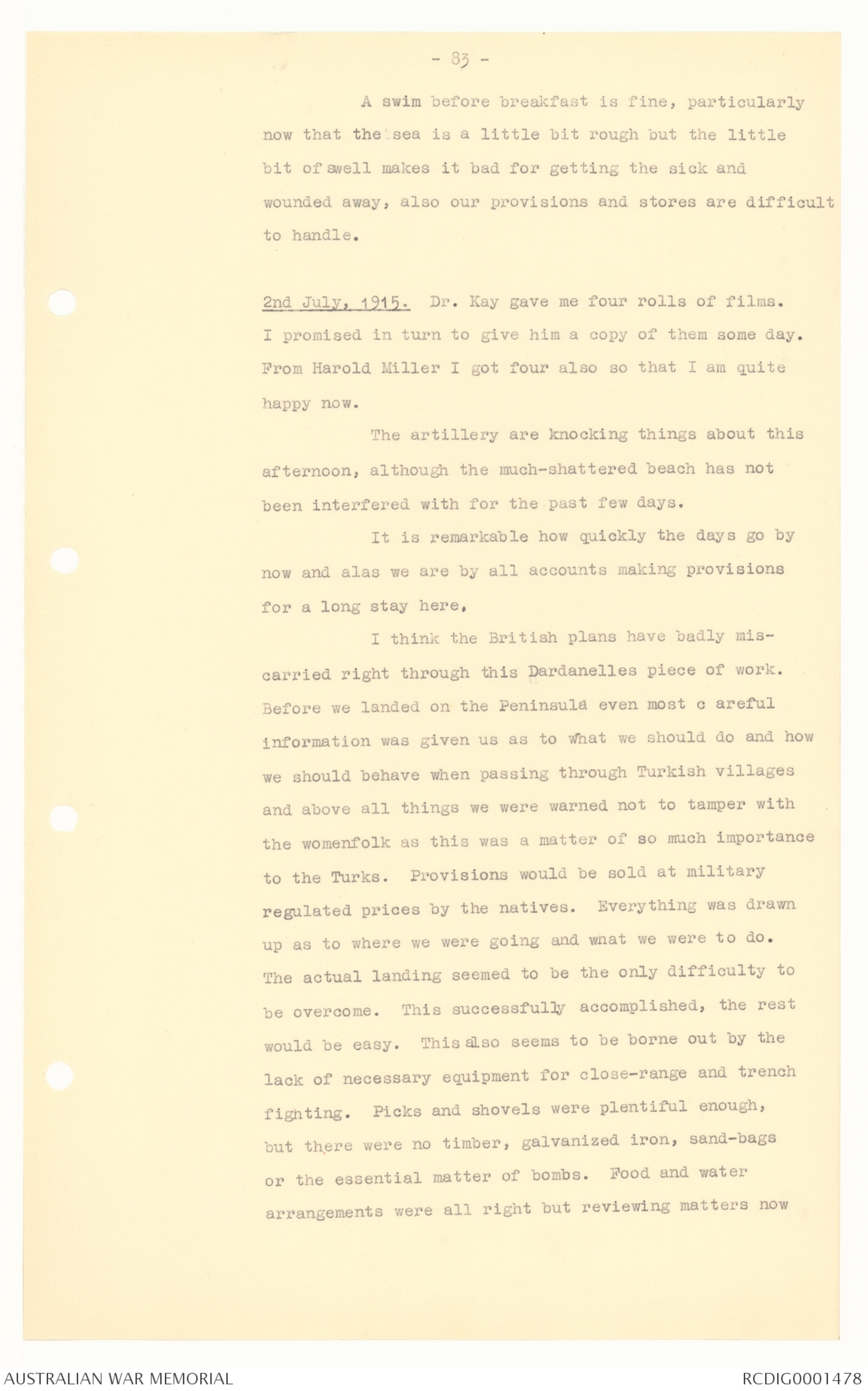
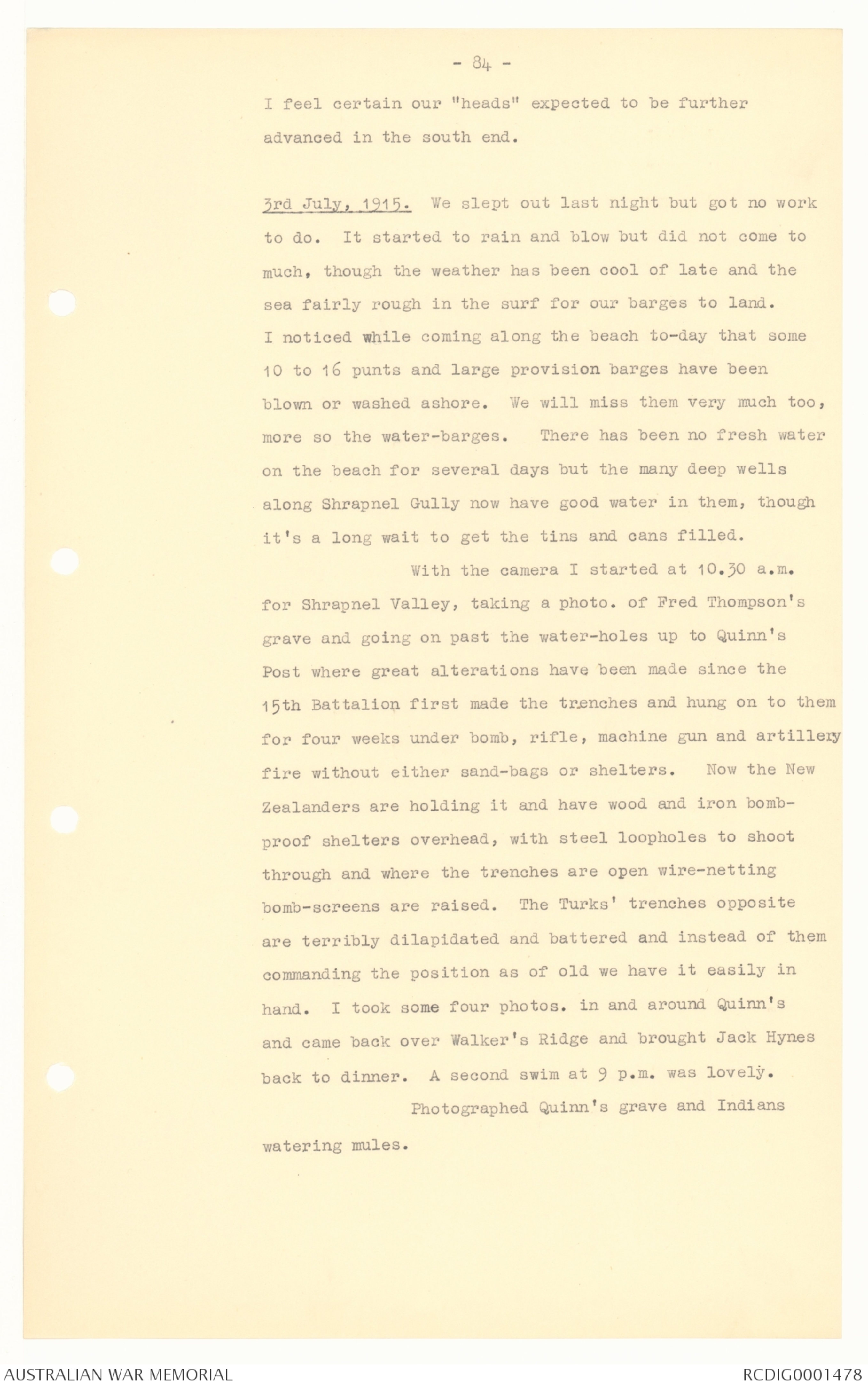
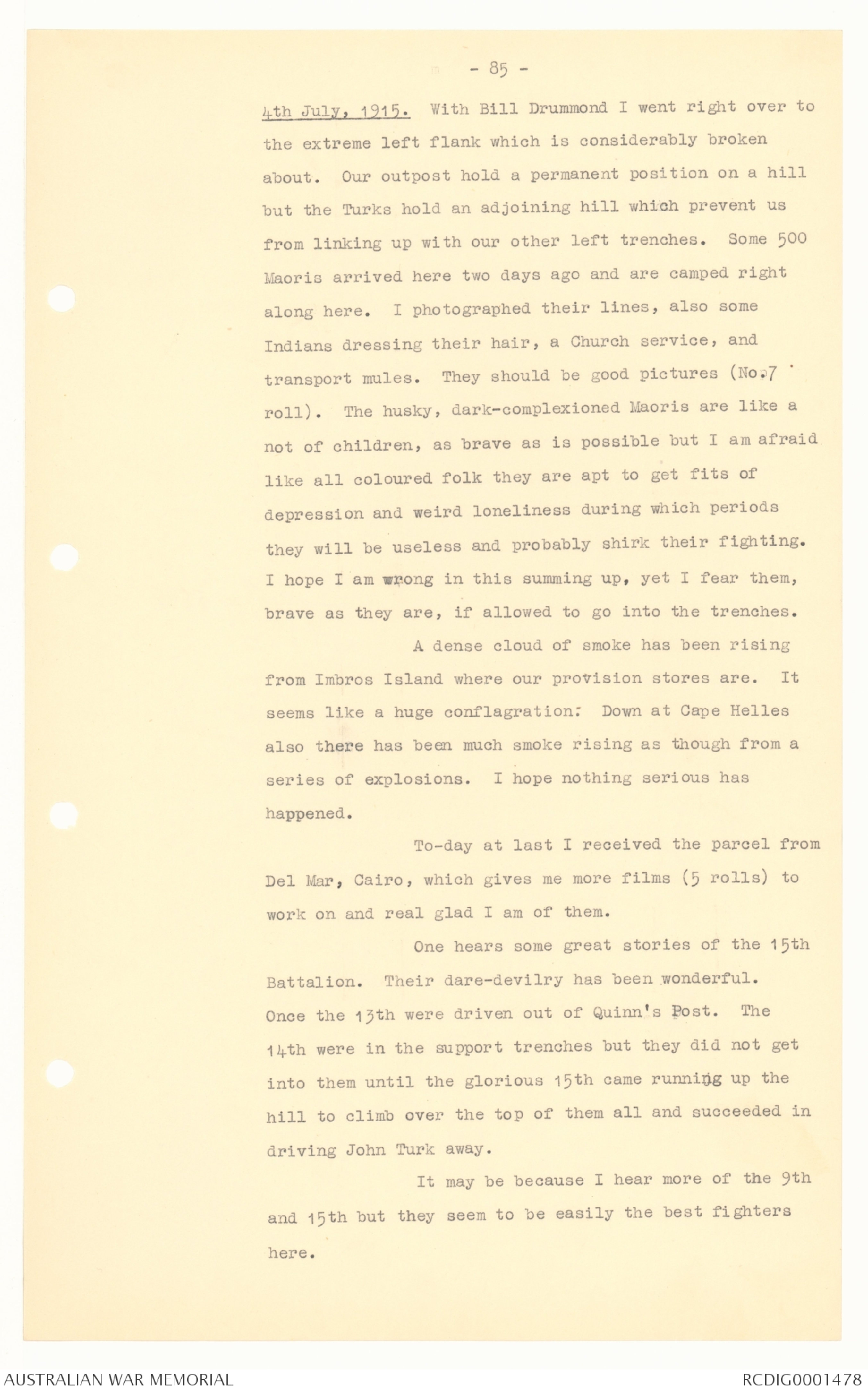
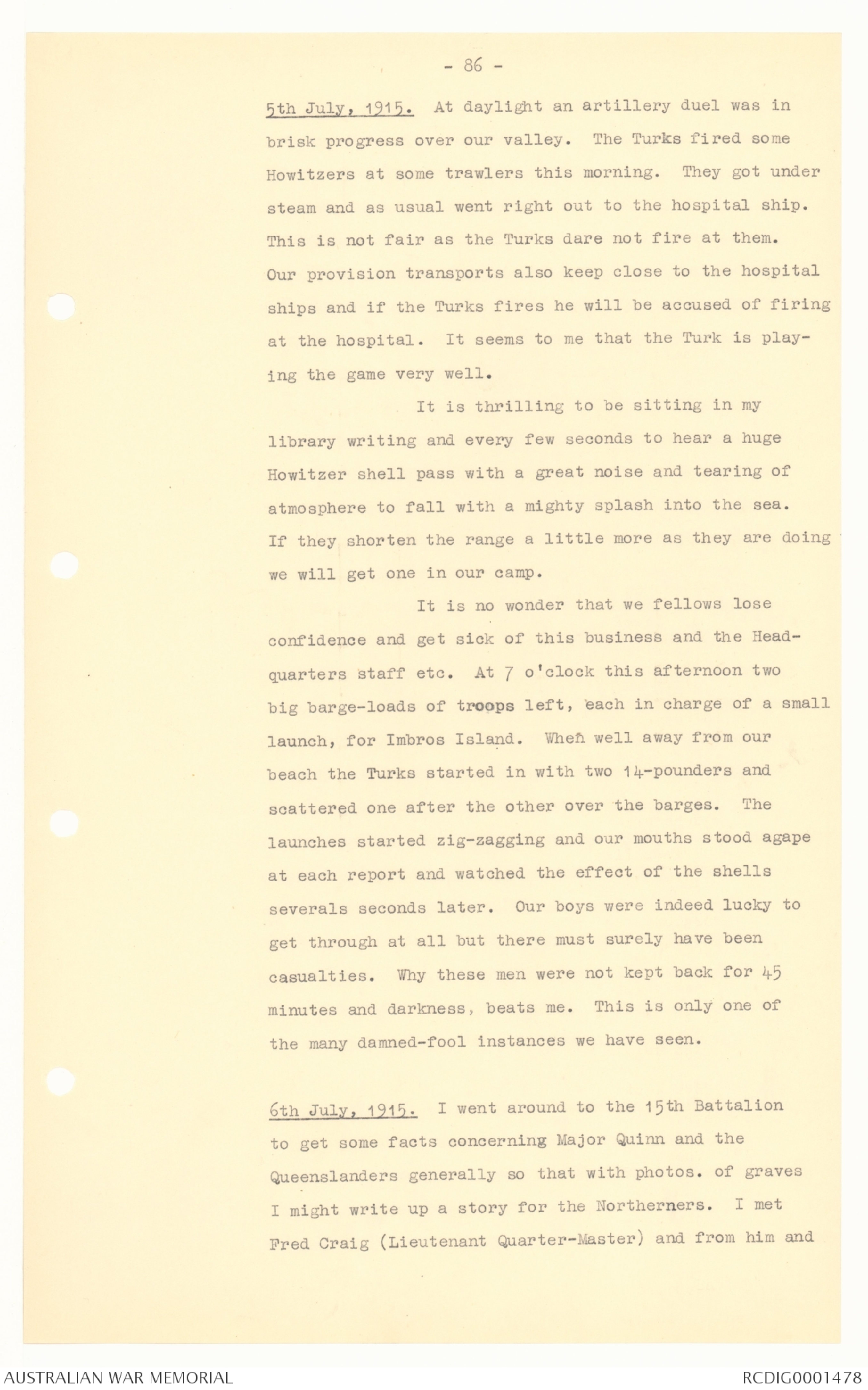
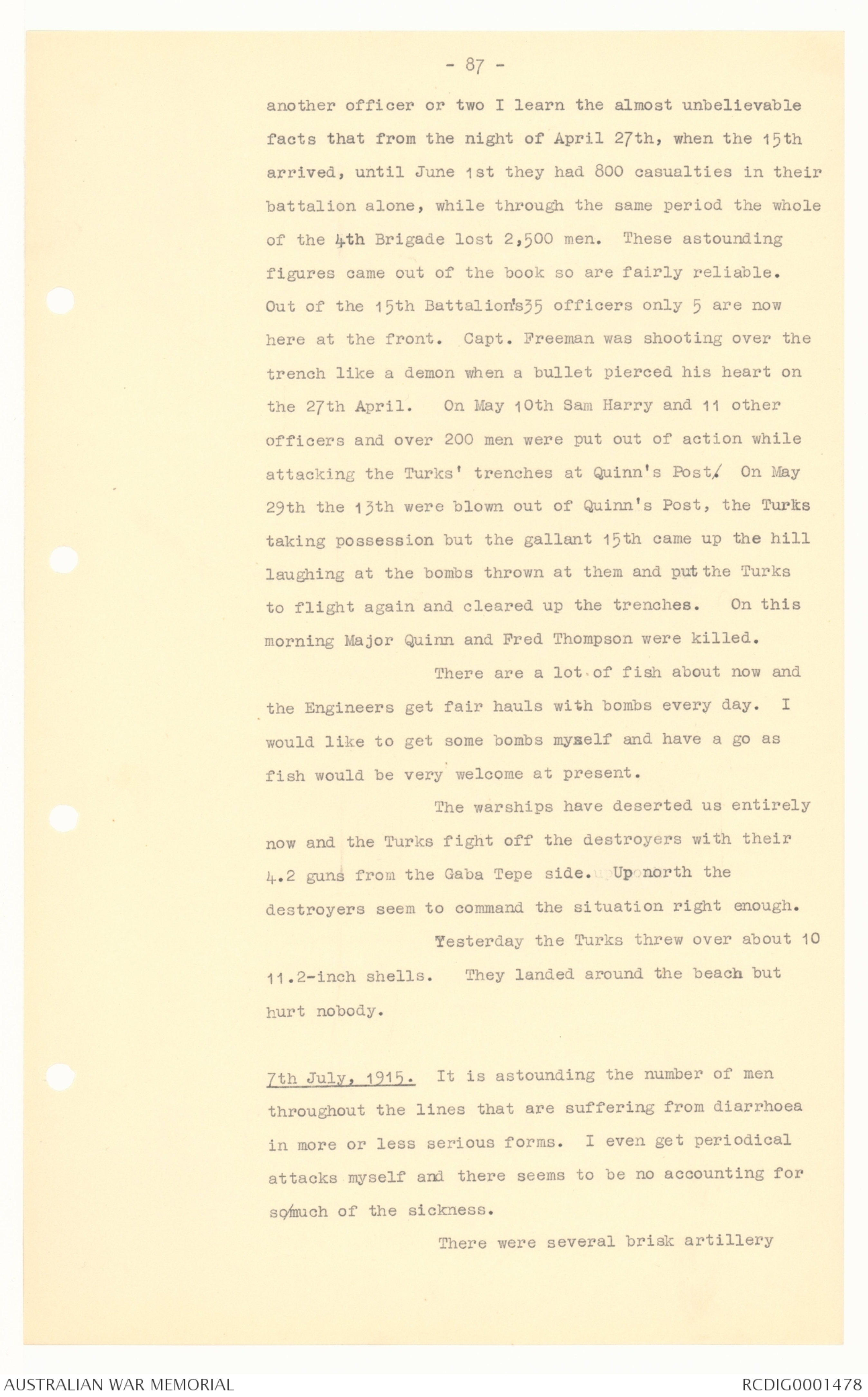
- 78-
24th June, 1915. To-day could not pass without 5 killed
and some 25 wounded while on the beach getting water and
swimming. Bill Rogers, one of our best men, got hit in
four places.
We now have four new Howitzers coming on
to the right flank which I hope will meet the situation
and keep ∧ back those nasty Turkish quick-firers which are
doing a lot of damage day after day.
I cannot get any films and feel damned
annoyed about it. All four sources seem to have failed.
A nice letter from McElvy came to-day.
25th June, 1915. This afternoon the "Lord Nelson" came
up from Cape Helles with seven torpedo boats as a guard
against submarine attack. It seemed almost pathetic that
a warship's existence depended almost upon the activeness
of these small craft. The "Lord Nelson" fired some 10
big gun shots across the Peninsula and a lot of 6 in.
shots and then went back again to Cape Helles. While
the "Lord Nelson" was shelling the Turks poured in
shrapnel which the warship never replied to. Flashes
were seen with every shot coming from the top of a high
hill and our men were quite indignant that we did not
fire on them but this only rose the question as to
whether they were false flashes or not, so intricate is this
war business.
26th June, 1915. To-day passed off with quite a lot of
artillery shelling, the beach paying the toll as usual
at our end, and I think Gaba Tepe Point paid toll also
as it got a rough handling from both land and sea. The
Turks here have been very active building in earthworks,
trenches, etc. There is a lot of movement noticeable at
present amongst our Headquarter Staff. Whether it is
caused by the Turks' preparation or our getting ready to
attack I don't know, but I hope so.
-79 -
27th June, 1915. The Turks have had quite a lot of fun
at our expense with their 6-in. Howitzers to-day,
breaking the cruel things right in on Headquarters gully.
Otherwise everything is monotonously slow with us.
There were five aeroplanes over Cape Helles late yesterday
and there was a lot of rushing and tearing about.
Some of them were probably German.
Church services are held everywhere
but the more secluded spots are of course chosen. Most
of our chaplains have now gone back to Alexandria to
attend the sick.
I have given a 9th Battalion man letters
to Harrison, Mother, Ruth, Hollingsworth (2). Copy of
"Triumph" and the "Church Service."
28th June, 1915. I am recommended for Award by Staff
Captain .............. Pollock, 7th Light Horse.
Mentioned in Despatches.
The day broke and breakfast passed
without anything very unusual happening but by 9 a.m.
the battleships in the south were making a brave showing.
Then from across Lemnos way there came 12 to 16 ships,
transports and a ship of war or two. This looked like
reinforcements being pushed in, and also savoured of an
attack with some considerable intent. A little later
from our look-out our torpedo-type craft were firing
heavily into Gaba Tepe Bay clearing up the trenches on
that prominent knoll of ground and working back upon
the trenches to the right flank of our own. A monitor
(the no-bottom style of thing that beats the submarines
so badly) was firing rapidly also along the much battered
Gaba Tepe way. At 1 o'clock about 120 of our men were
seen to come out of our most southerly communication
trenches. Later with bayonets fixed they were seen
amongst the bushes in front of the old Turkish trenches.
- 80 -
Scenting a lot of trouble and some excitement
I took my bandage bag and went away up, but to my surprise
they asked me if I would go in along the trenches and see
what Captain Dods was going to do with his wounded. I
went in, had a look round and could see that no arrangements
of any kind had been made to get the wounded away,
who were walking about in half bandages and no bandage
at all, kind of a way and without knowing where to go.
I went back to our Captains and asked them to come in
with eight men and give Capt. Dods a hand. Three of us
then went right into the trenches. It was now about
4 o'clock and the 5th Light Horse were retiring, bringing
back some of their wounded with them without stretchers
and mostly without sheets. Two fellows threw one man out
of a trench who had been struck by a shell and taken away
the whole of his right leg. He was quite conscious and
spoke to several of his mates. I have never seen anything
like this fellow in my life - as calm as ever a
man was -nor have I seen a more gruesome sight. What
was left of the leg would not have weighed 3 lbs. but
for the boot and the foot inside it. The other leg was
uninjured. After getting him down amongst the rough
brambles and trees, I came back and by glory, the
bullets and shrapnel were thicker than ever. Six men
came along with a comrade who showed a gaping wound on
the thigh, a coat covering the remainder of the leg.
I stopped them and covered the wound from the flies, then
I saw that the shin-bone was smashed to a pulp. I
covered it up also when, lo and behold, in lifting the
coat to cover the leg again I saw that the foot on the
same leg was blown clean away altogether. What a dreadful
case'. A great shock even to myself. I went back
home at 6.30 and did some stretcher-bearing up to 10.
It was indeed a cruel kind of a day. What a
frightful mistake not to have had a supply of stretchers
- 81 -
and splints at the most convenient station and an
organised line of first-aiders and stretcher-bearers.
Fancy doing up a shattered arm with a bayonet sheath!
The fellow was in agony with it too but there was no
relief for hours for him.
The whole attack seems to have been more
in the way of a demonstration so as to prevent the
Turks from sending reinforcements down south where I
have since heard the English made a valuable improvement
in their position. Rather a gruesome demonstration,
right enough! We left on retiring a number of dead.
I hit them with stones from the trenches to make sure
they were not conscious. The wounded were probably
15 very badly and 30 mediums, but it is indeed difficult
to tell. Much as I enjoyed or rather valued the
experience, I have no desire, if only for the sake of
others, to expose myself to such a hail of bullets and
showers of shrapnel again.
The killed amounted to 70 odd for this
day's "demonstration."
It was this morning that the Turks sent
in an invitation for all Australians and N.2 to come and
stay with them. They had plenty of food and entertainment,
etc.
29th June, 1915. We are experiencing terrifically hot
days now. It seems as hot as I have ever known it,
even on the plantation up Herbert River way.
There has hardly been a shot fired around
our way to-day but down south the ships have been pouring
heavy fires at intervals.
The "demonstration" here yesterday is
reported as being more successful than was expected.
The English and French made a lot of trenches and ground
through our being able to prevent the Turks from taking
any troops away from here for the south.
- 82 -
I have ascertained that we struck in three
places yesterday - first with the 9th Battalion
(Queensland), further along with the 11th Battalion,
and on the extreme right with the 5th Light Horse
(Queensland). In each case the parties were about
150 strong and, say to say, the losses were in killed
27, 18 and 25 respectively. John Turk lost heavily also -
in thousands I believe. George Barr of the 9th deplores
the lack of instruction and control that they had yesterday.
They did not know where to go or anything, but they
got into the Turks' trenches and having not one bomb
amongst them they were useless.
30th June, 1915. To-day is very hot again. Nothing more
important than 6 eggs between 4 has so far occurred -
the first since leaving Cairo nearly three months ago
now.
Yesterday I saw 15 men and 3 officers of the
11th Battalion buried - a pitiful sight. Yet there are
others that are not likely to be buried for some time.
A windstorm sprang up last night and blew
furiously for an hour. To-day the sea is so rough that
the wounded and sick, of whom there are hundreds, could
not get aboard the barge to go across to the hospital
ship.
1st July, 1915. Another month gone !! That is two
whole months and five days since we landed here and
8 months 11 days since leaving Sydney and it seems to
me like many months before our dangers will be over.
I wrote 16 toilet pages for Lorrie Allen
to-day and will have to answer M. Elvy's nice letter of
April 27th. Annie Stout I have not heard of. In fact
I feel kind of neglected all round just now.
- 83 -
A swim before breakfast is fine, particularly
now that the sea is a little bit rough but the little
bit of swell makes it bad for getting the sick and
wounded away, also our provisions and stores are difficult
to handle.
2nd July, 1915. Dr. Kay gave me four rolls of films.
I promised in turn to give him a copy of them some day.
From Harold Miller I got four also so that I am quite
happy now.
The artillery are knocking things about this
afternoon, although the much-shattered beach has not
been interfered with for the past few days.
It is remarkable how quickly the days go by
now and alas we are by all accounts making provisions
for a long stay here.
I think the British plans have badly miscarried
right through this Dardanelles piece of work.
Before we landed on the Peninsula even most c areful
information was given us as to what we should do and how
we should behave when passing through Turkish villages
and above all things we were warned not to tamper with
the womenfolk as this was a matter of so much importance
to the Turks. Provisions would be sold at military
regulated prices by the natives. Everything was drawn
up as to where we were going and what we were to do.
The actual landing seemed to be the only difficulty to
be overcome. This successfully accomplished, the rest
would be easy. This also seems to be borne out by the
lack of necessary equipment for close-range and trench
fighting. Picks and shovels were plentiful enough,
but there were no timber, galvanized iron, sand-bags
or the essential matter of bombs. Food and water
arrangements were all right but reviewing matters now
- 84 -
I feel certain our "heads" expected to be further
advanced in the south end.
3rd July, 1915. We slept out last night but got no work
to do. It started to rain and blow but did not come to
much, though the weather has been cool of late and the
sea fairly rough in the surf for our barges to land.
I noticed while coming along the beach to-day that some
10 to 16 punts and large provision barges have been
blown or washed ashore. We will miss them very much too,
more so the water-barges. There has been no fresh water
on the beach for several days but the many deep wells
along Shrapnel Gully now have good water in them, though
it's a long wait to get the tins and cans filled.
With the camera I started at 10.30 a.m.
for Shrapnel Valley, taking a photo. of Fred Thompson's
grave and going on past the water-holes up to Quinn's
Post where great alterations have been made since the
15th Battalion first made the trenches and hung on to them
for four weeks under bomb, rifle, machine gun and artillery
fire without either sand-bags or shelters. Now the New
Zealanders are holding it and have wood and iron bomb-proof
shelters overhead, with steel loopholes to shoot
through and where the trenches are open wire-netting
bomb-screens are raised. The Turks' trenches opposite
are terribly dilapidated and battered and instead of them
commanding the position as of old we have it easily in
hand. I took some four photos. in and around Quinn's
and came back over Walker's Ridge and brought Jack Hynes
back to dinner. A second swim at 9 p.m. was lovely.
Photographed Quinn's grave and Indians
watering mules.
- 85 -
4th July, 1915. With Bill Drummond I went right over to
the extreme left flank which is considerably broken
about. Our outpost hold a permanent position on a hill
but the Turks hold an adjoining hill which prevent us
from linking up with our other left trenches. Some 500
Maoris arrived here two days ago and are camped right
along here. I photographed their lines, also some
Indians dressing their hair, a Church service, and
transport mules. They should be good pictures (No.7
roll). The husky, dark-complexioned Maoris are like a
not of children, as brave as is possible but I am afraid
like all coloured folk they are apt to get fits of
depression and weird loneliness during which periods
they will be useless and probably shirk their fighting.
I hope I am wrong in this summing up, yet I fear them,
brave as they are, if allowed to go into the trenches.
A dense cloud of smoke has been rising
from Imbros Island where our provision stores are. It
seems like a huge conflagration: Down at Cape Helles
also there has been much smoke rising as though from a
series of explosions. I hope nothing serious has
happened.
To-day at last I received the parcel from
Del Mar, Cairo, which gives me more films (5 rolls) to
work on and real glad I am of them.
One hears some great stories of the 15th
Battalion. Their dare-devilry has been wonderful.
Once the 13th were driven out of Quinn's Post. The
14th were in the support trenches but they did not get
into them until the glorious 15th came running up the
hill to climb over the top of them all and succeeded in
driving John Turk away.
It may be because I hear more of the 9th
and 15th but they seem to be easily the best fighters
here.
- 86 -
5th July, 1915. At daylight an artillery duel was in
brisk progress over our valley. The Turks fired some
Howitzers at some trawlers this morning. They got under
steam and as usual went right out to the hospital ship.
This is not fair as the Turks dare not fire at them.
Our provision transports also keep close to the hospital
ships and if the Turks fires he will be accused of firing
at the hospital. It seems to me that the Turk is playing
the game very well.
It is thrilling to be sitting in my
library writing and every few seconds to hear a huge
Howitzer shell pass with a great noise and tearing of
atmosphere to fall with a mighty splash into the sea.
If they shorten the range a little more as they are doing
we will get one in our camp.
It is no wonder that we fellows lose
confidence and get sick of this business and the Headquarters
staff etc. At 7 o'clock this afternoon two
big barge-loads of troops left, each in charge of a small
launch, for Imbros Island. When well away from our
beach the Turks started in with two 14-pounders and
scattered one after the other over the barges. The
launches started zig-zagging and our mouths stood agape
at each report and watched the effect of the shells
severals seconds later. Our boys were indeed lucky to
get through at all but there must surely have been
casualties. Why these men were not kept back for 45
minutes and darkness, beats me. This is only one of
the many damned-fool instances we have seen.
6th July, 1915. I went around to the 15th Battalion
to get some facts concerning Major Quinn and the
Queenslanders generally so that with photos. of graves
I might write up a story for the Northerners. I met
Fred Craig (Lieutenant Quarter-Master) and from him and
- 87 -
another officer or two I learn the almost unbelievable
facts that from the night of April 27th, when the 15th
arrived, until June 1st they had 800 casualties in their
battalion alone, while through the same period the whole
of the 4th Brigade lost 2,500 men. These astounding
figures came out of the book so are fairly reliable.
Out of the 15th Battalion's35 officers only 5 are now
here at the front. Capt. Freeman was shooting over the
trench like a demon when a bullet pierced his heart on
the 27th April. On May 10th Sam Harry and 11 other
officers and over 200 men were put out of action while
attacking the Turks' trenches at Quinn's Post. On May
29th the 13th were blown out of Quinn's Post, the Turks
taking possession but the gallant 15th came up the hill
laughing at the bombs thrown at them and put the Turks
to flight again and cleared up the trenches. On this
morning Major Quinn and Fred Thompson were killed.
There are a lot of fish about now and
the Engineers get fair hauls with bombs every day. I
would like to get some bombs myself and have a go as
fish would be very welcome at present.
The warships have deserted us entirely
now and the Turks fight off the destroyers with their
4.2 guns from the Gaba Tepe side. Up north the
destroyers seem to command the situation right enough.
Yesterday the Turks threw over about 10
11.2-inch shells. They landed around the beach but
hurt nobody.
7th July, 1915. It is astounding the number of men
throughout the lines that are suffering from diarrhoea
in more or less serious forms. I even get periodical
attacks myself and there seems to be no accounting for
so much of the sickness.
There were several brisk artillery
 Loretta Corbett
Loretta CorbettThis transcription item is now locked to you for editing. To release the lock either Save your changes or Cancel.
This lock will be automatically released after 60 minutes of inactivity.